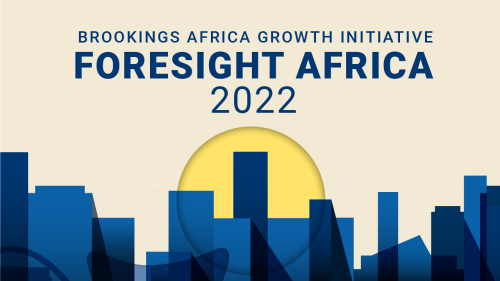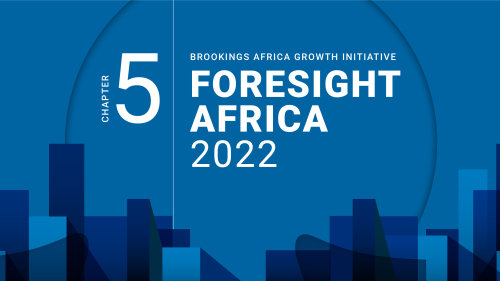On January 20, the Brookings Africa Growth Initiative (AGI) released its annual Foresight Africa report, which explores top priorities for the region in the coming year. Among other priorities, the 2022 edition explores major trends for Africa in 2022, including its economic recovery from the COVID-19 pandemic, public health, the empowerment of African women and girls, climate change, technological innovation, and the region’s external relations.
In his viewpoint in Chapter 5, Bitange Ndemo of the University of Nairobi outlines the rapidly increasing role of cryptocurrencies in sub-Saharan Africa. As shown in Figure 1, Africa is the fastest-growing cryptocurrency market among developing economies as well as the third-fastest growing market in the world, yet it remains the smallest. In fact, Foresight Africa notes, according to the data platform Chainalysis, the continent has seen a 1,200 percent increase in cryptocurrency payments from 2020 to 2021. Additionally, Chainalysis ranks Kenya, South Africa, and Nigeria among the top 10 countries in the world in terms of cryptocurrency use.
Figure 1. Africa’s cryptocurrency market in a global context
 Source: Ordu, A., & Golubski, C. (Eds.). (2022). Foresight Africa: Top Priorities for the Continent in 2022. Washington, DC: Brookings Institution.
Source: Ordu, A., & Golubski, C. (Eds.). (2022). Foresight Africa: Top Priorities for the Continent in 2022. Washington, DC: Brookings Institution.
Ndemo observes that cryptocurrencies are well-positioned to facilitate remittances since crypto transfers bypass traditional banking services, allowing for significantly faster and cheaper international money transfers. In fact, research from Chainalysis finds that cryptocurrency transfers associated with remittance payments have seen rapid growth, in terms of both value and volume, since the start of the COVID-19 pandemic (Figure 2).
Figure 2. The growing role of cryptocurrency for remittance payments in Africa
 Source: Ordu, A., & Golubski, C. (Eds.). (2022). Foresight Africa: Top Priorities for the Continent in 2022. Washington, DC: Brookings Institution.
Source: Ordu, A., & Golubski, C. (Eds.). (2022). Foresight Africa: Top Priorities for the Continent in 2022. Washington, DC: Brookings Institution.
Ndemo notes that blockchain technologies are the future and warns that any effort to ban them—or even excessively intervene in their operations—might meet the same fate as other state attempts to circumscribe behavior. In fact, he says that restricting cryptocurrencies now, when they are facilitating innovations and brimming with potential, would undermine financing of critical sectors like micro-, small-, and medium-sized enterprise; affordable housing; and remittance payments right when Africa needs these options most. Instead, Ndemo recommends that African countries establish a similar “regulatory sandbox” approach to crypto as Kenya. He states that taking an approach that offers a safe space for the supervision of burgeoning technologies, techniques, or services, would allow the state to encourage experimentation and development without officially authorizing new practices.
For Ndemo’s full viewpoint and other reflections on the role of technology in Africa’s development, see Chapter 5, “Technological innovations: Creating and harnessing tools for improved livelihoods,” in Foresight Africa 2022.






Commentary
Figure of the week: The rapidly increasing role of cryptocurrencies in Africa
January 27, 2022